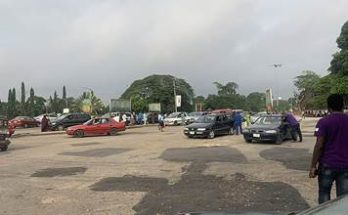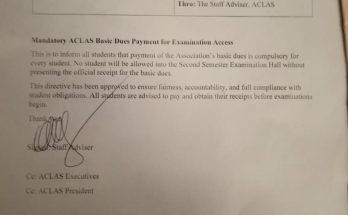By: Olúwábùkúnmi Abraham Awóṣùsì
On a Sunday evening, I decided to take a long stroll inside the school to clear my head. But as I walked past the senate building, I saw a group of students, hand-joined in a circular form—this scene is very familiar, but this evening, I plugged my earbud and continued my stroll.
As I walked past Mellanby hall, I recalled reading the WhatsApp status of Student A the week before. How he lamented on the incessant Christian fellowships in Tedder Hall and how it has become unbearable. In his post, he stated, “omoooo, person no fit just rest again. this fellowship don start again.” I chuckled and even took it as another round of bants. But as I passed by Mellanby Hall, a wave of realization hit me and I remembered the WhatsApp status. Suddenly, I realised how unpalatable it must have been for Student A who may have wanted to study but couldn’t, due to the noises of the fellowship speaker.
This reminded me of Seun. Twelve years before Student A, a 400-Level Law student, Seun Bunmi Adegunsoye disguised herself into the UI Central Mosque during Jumat, perhaps possessed with extremism, to contest with Imam’s sermon by shouting, “Except you accept Christ in your life, you are not safe. All of you here, no matter the number of the congregation accept Jesus Christ. Allah is not God. Jesus is God.” Consequently, this led to a protest by Islamic faithfuls, who demanded: “banning preaching and other forms of worship in lecture halls, residential halls and other public places outside designated areas.” Jagged back to the Sunday evening, I looked at the array of students sauntering through the road—some were discussing the crusade rally held earlier the day, the other were discussing how Monday is the day next and every other person was back to themselves after many shouts of worship.
The first question I asked myself is, What is a University? Narrowly, a university is an institution of higher learning providing facilities for teaching and research and is authorised to grant academic degrees. Simply put, a university is a place for learning—exclusively. So, if a university is a place of learning how so has it become a place of competing loudspeakers of worshipers?
In order not to become a victim of the fallacy of hasty generalisation, I surveyed some of the halls in the school including; Nnamdi Azikiwe Hall, Queen Elizabeth Hall, Kenneth Mellanby Hall, Obafemi Awolowo Hall, Queen Idia Hall, Independence Hall, Lord Tedder Hall, Reverend Israel Oladotun Ransome-Kuti Hall, and Sultan Bello Hall. However, each Hall was represented by one resident and each person was asked at a different time in order to avoid the influence of decisions.
Lord Tedder Hall Resident
In response to my question, he exclaimed, “Broo!” I waited for him to gather his thoughts together and he replied, “I complained about them every day.” And went on to lament how they use the Senior Common Room (SCR) and two other rooms to conduct fellowships every day.
Kenneth Mellanby Hall Resident
In response to my question, he stated how the Volleyball court has become a ground of worship, making it the modern Bethsaida pool of miracles. “At least once every day on the volleyball court. Everything altogether sha is more than 10 times a week.” Then I inquired again if the Volleyball court is the only place they worship and he stated, “Every morning yes, for morning watch. But for actual fellowship, they use common room.”
Obafemi Awolowo Hall Resident
One would think that Awo Hall, despite its distance will have a reduction but a resident explained how she has notably witnessed invitations and room preachings even though she stated that she’s not a churchy person, a criterion which was not important to this survey, she noted: “We had some girls talk about a program last month, some people came today. And ummm, one girl preached in the morning and disturbed my sleep. Then one girl calls my roommate to pray in the morning.”
Reverend Israel Oludotun Ransome-Kuti Hall Resident
In his three minutes and four seconds voice note, a 400-Level student stated how Hall fellowships have been happening since when he was in 100-Level. He even noted some which he attended at the SCR building in Mellanby, and the SCR building in Kuti. In his personal experience, he expressed how he would have to close the door & windows of his room in 100-Level to reduce the noises of fellowship speakers so that he could manage to read a few pages before he moved to other things of the day. He lamented how he suffered so much in his room, which was beside a fellowship room, and stressed: “it is not proper.”
Independence Hall Resident
In response to my survey question, he noted his hall fair in the lots: “Well, depending on the few gatherings I have seen so far, I know of two centres. But a Church gathers at the Cafeteria on Sundays.” He concluded by saying three fellowships always happen in the hall in a week. However, a student noted how Independence and Zik Hall have become the ground of prayers more than any other hall. Either three fellowships in a week or a myriad of fellowships, what stands is that fellowship has infiltrated the Independence Hall as well.
Queen Elizabeth II Hall Resident
In her two voice notes, she noted how often fellowship happens in the hall. She further mentioned how different denominations seek you out, imploring you to join their fellowships and how she often heard at least one loudspeaker every day whenever she comes back from class.
Nnamdi Azikwe Hall Resident
“I don’t understand again these days. You go just dey waka, na so fellowship dey happen everywhere. You no even Sabi which is which.” He noted in our conversation on a stroll. “Sometimes, dem go use the football court, you sabi Marakanah (?) na, Cafeteria too, sometimes you go just dey hear people dey shout for midnight.” He expressed his disappointment on how fellowship speakers now litter the hall.
Sultan Bello Hall Residents
A resident pointed out that over 5 fellowship services hold in a week in Bello Hall and the major locations are the Bello Dome and the SCR building. In a conversation with a 400-L resident, he noted how it has become a big issue in the hall. He recounted how the residents were denied access to the common room to watch the World Cup because there was a fellowship going on. “In fact, Dem talk says Dem go carry the television.” Wrapping up his claim, he noted that these issues have reportedly been taken up to higher authorities.
Queen Idia Hall Resident
In her 58 seconds voice note, she narrated one of her personal experiences. It was 9 pm, and students were weary from lectures. Suddenly, they began to hear some students shouting and singing. When her bunkmate couldn’t take the noise, she called out to them and challenged them to leave lest she would pour water on them. In another response to the ubiquitousness of religious fellowships, “Haaaaa! It is too much. Even in the night,” she exclaimed in Yoruba language. Some of these students form groups of singers, some praying, some chanting, among other various religious activities.
From this survey, it became clear that the WhatsApp status of Student A was never a mere bant but an epidemic affecting the hall residents.
I remembered while I was in 100-Level, I would often be accosted by adherents trying to convince me to become a proselyte to their denomination. Even though most times, I pointed out that it either doesn’t suit my interest or my discipleship is submitted to another denomination, they would still attempt to pacify me to come and taste or even experience miracles.
If Karl Marx regarded religion as the “opium of the masses”, perhaps, the University of Ìbàdàn is becoming a factory and a distributor of this opium.



